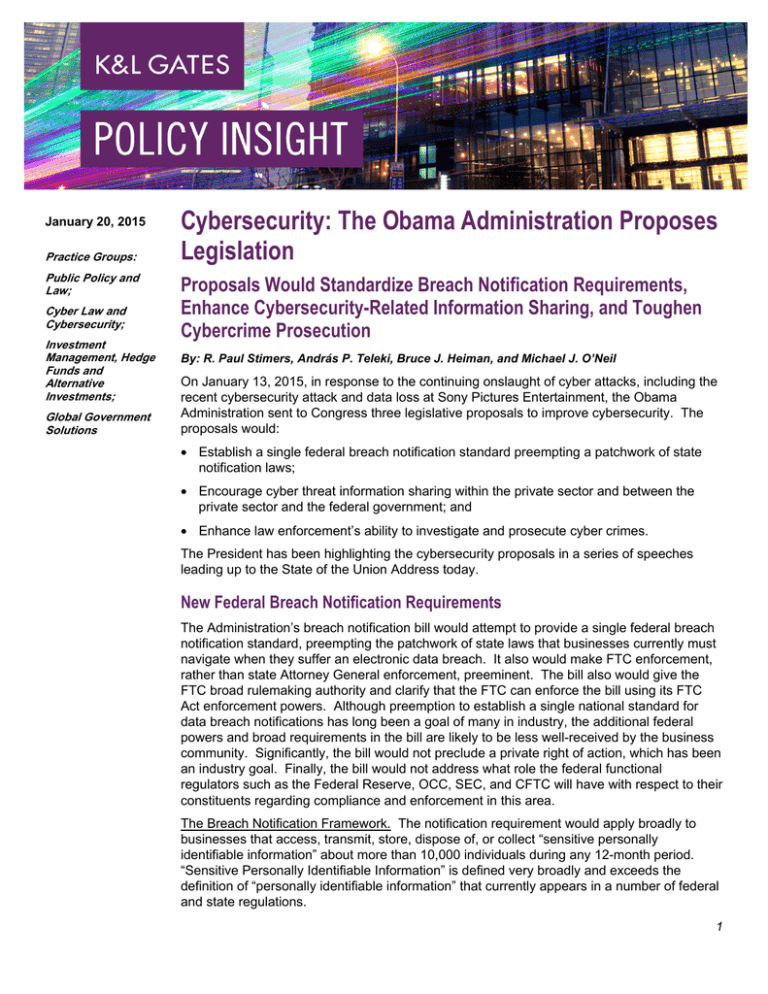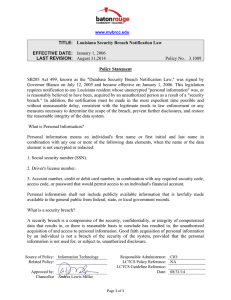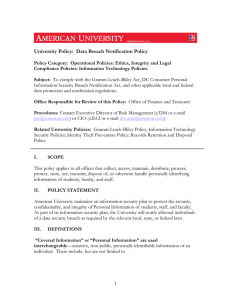
January 20, 2015
Practice Groups:
Public Policy and
Law;
Cyber Law and
Cybersecurity;
Investment
Management, Hedge
Funds and
Alternative
Investments;
Global Government
Solutions
Cybersecurity: The Obama Administration Proposes
Legislation
Proposals Would Standardize Breach Notification Requirements,
Enhance Cybersecurity-Related Information Sharing, and Toughen
Cybercrime Prosecution
By: R. Paul Stimers, András P. Teleki, Bruce J. Heiman, and Michael J. O’Neil
On January 13, 2015, in response to the continuing onslaught of cyber attacks, including the
recent cybersecurity attack and data loss at Sony Pictures Entertainment, the Obama
Administration sent to Congress three legislative proposals to improve cybersecurity. The
proposals would:
• Establish a single federal breach notification standard preempting a patchwork of state
notification laws;
• Encourage cyber threat information sharing within the private sector and between the
private sector and the federal government; and
• Enhance law enforcement’s ability to investigate and prosecute cyber crimes.
The President has been highlighting the cybersecurity proposals in a series of speeches
leading up to the State of the Union Address today.
New Federal Breach Notification Requirements
The Administration’s breach notification bill would attempt to provide a single federal breach
notification standard, preempting the patchwork of state laws that businesses currently must
navigate when they suffer an electronic data breach. It also would make FTC enforcement,
rather than state Attorney General enforcement, preeminent. The bill also would give the
FTC broad rulemaking authority and clarify that the FTC can enforce the bill using its FTC
Act enforcement powers. Although preemption to establish a single national standard for
data breach notifications has long been a goal of many in industry, the additional federal
powers and broad requirements in the bill are likely to be less well-received by the business
community. Significantly, the bill would not preclude a private right of action, which has been
an industry goal. Finally, the bill would not address what role the federal functional
regulators such as the Federal Reserve, OCC, SEC, and CFTC will have with respect to their
constituents regarding compliance and enforcement in this area.
The Breach Notification Framework. The notification requirement would apply broadly to
businesses that access, transmit, store, dispose of, or collect “sensitive personally
identifiable information” about more than 10,000 individuals during any 12-month period.
“Sensitive Personally Identifiable Information” is defined very broadly and exceeds the
definition of “personally identifiable information” that currently appears in a number of federal
and state regulations.
1
Cybersecurity: The Obama Administration Proposes Legislation
Proposals Would Standardize Breach Notification Requirements, Enhance CybersecurityRelated Information Sharing, and Toughen Cybercrime Prosecution
Under the bill, following the discovery of a security breach of sensitive personally identifiable
information, the business would be required to notify any individual whose sensitive
personally identifiable information has been, or is reasonably believed to have been,
accessed or acquired, unless there is no reasonable risk of harm or fraud to such individual
and certain conditions have been met by the business (i.e., the business has conducted a
risk assessment that concludes that there is no reasonable risk of harm, and the business
notifies the FTC in writing of the results of the risk assessment and its decision to invoke the
exemption).
The burden of proof will be on the affected company to conduct a risk assessment to
determine whether that conclusion is supportable and to report that conclusion to the
FTC. The bill also includes a rebuttable presumption that there is no such risk if the data
was encrypted or otherwise unusable. A second exemption would apply if the business used
a security program that “effectively blocks the use of the sensitive personally identifiable
information to initiate unauthorized financial transactions before they are charged to the
account of the individual and provides notice to affected individuals after a security breach
that has resulted in fraud or unauthorized transactions.”
With few exceptions, all notifications must be made without “unreasonable delay” following
the discovery by the business of a security breach - generally no later than 30 days
regardless of the size of the breach or the information at risk – a provision that industry will
undoubtedly seek to tighten to prevent over-reporting. For larger breaches or in special
circumstances, companies would also have to notify credit reporting agencies and various
law enforcement agencies. Federal law enforcement agencies may, subject to certain
conditions, require businesses to delay notifications in cases where such notification would
impede a criminal investigation or national security activity.
Other Requirements. The bill sets forth the methods of notice, as well as the content of the
notice, and contemplates e-mail notice, if the individual has “consented to receive such
notice and the notice is consistent with the provisions permitting electronic transmission of
notices under section 101 of [E-Sign].” The bill also contemplates companies entering into
contractual arrangements that specify which entity would provide the requisite notice in the
event of a breach.
The bill provides one exception to its data breach notification standards. They would not
supersede the data breach notification requirements for breaches involving protected health
information governed by the Health Information Technology for Economic and Clinical Health
Act, which would remain in effect for covered entities, business associates and vendors of
personal health records, and third-party service providers, which themselves are strict and
provide for detailed notifications.
Information Sharing
The Administration’s information sharing bill would offer companies civil and criminal liability
protection in an effort to encourage them to share information about cyber threats and
vulnerabilities. The proposal designates the newly authorized National Cybersecurity and
Communications Information Center as a clearinghouse for this information. In an attempt to
address privacy concerns, it would require companies to make reasonable efforts to redact
sensitive personally identifiable information before sharing, but privacy advocates have
expressed concerns that this provision is too vague. They also are concerned about
excessive sharing of information among government agencies.
2
Cybersecurity: The Obama Administration Proposes Legislation
Proposals Would Standardize Breach Notification Requirements, Enhance CybersecurityRelated Information Sharing, and Toughen Cybercrime Prosecution
Law Enforcement
The Administration’s law enforcement proposals include expanding federal powers to
prosecute the sale of botnets and to shut down criminal botnets; criminalizing the overseas
sale of stolen financial sensitive personally identifiable information; updating the
Racketeering Influenced and Corrupt Organizations (RICO) Act to apply to cybercrime; and
updating the Computer Fraud and Abuse Act to apply to insider hacking, while limiting
criminal prosecutions based on violations of terms of service. The last law to update
cybercrime enforcement was enacted several years ago.
Congressional Reaction and Prospects
President Obama has stated that cybersecurity is an area in which he and the Republicancontrolled House and Senate can work together (in addition to trade and tax). Speaker
Boehner has responded that House and Senate Republicans would work with the President
and their Democratic counterparts to address the issue. He noted that the House has
passed a number of cybersecurity bills that have failed to pass the Senate in recent years.
Senator John Thune (R-SD), who has just assumed the Chairmanship of the Senate
Commerce Committee, suggested that the President was late to the discussion but
welcomed his participation on the issue. Breach notification bills were considered but not
passed in the 113th Congress. Senate Commerce Committee Ranking Member Bill Nelson
(D-FL) followed the Administration’s announcement with word that he would introduce a data
breach notification bill that would complement the Administration’s proposal while meeting
the Administration’s goals. His bill would be a modified version of the Data Security and
Breach Notification Act that he and several Democratic colleagues introduced in the 113th
Congress. Senator Chuck Grassley (R-IA), who now chairs the Senate Judiciary Committee,
also announced plans to introduce data breach legislation. An information sharing bill passed
the House in the 113th Congress. A Senate version was reported out of the Intelligence
Committee but did not pass the Senate due to privacy concerns.
Conclusion
Although this bill is not likely to be the last salvo in the cybersecurity and data protection
fight, it offers a view into the current Administration’s thinking on the questions of what
constitutes sensitive personally identifiable information, how a federal breach notification
regime may look, and the circumstances under which reporting would not be required at the
federal level. It also adds fuel to the fire for congressional action in this area.
3
Cybersecurity: The Obama Administration Proposes Legislation
Proposals Would Standardize Breach Notification Requirements, Enhance CybersecurityRelated Information Sharing, and Toughen Cybercrime Prosecution
Authors:
R. Paul Stimers
paul.stimers@klgates.com
+1.202.661.3883
András P. Teleki
andras.teleki@klgates.com
+1.202.778.9477
Bruce J. Heiman
bruce.heiman@klgates.com
+1.202.661.3935
Michael J. O'Neil
mike.oneil@klgates.com
+1.202.661.6226
Additional Contacts:
Holly K. Towle
holly.towle@klgates.com
+1.206.370.8334
Robert E. Feyder
robert.feyder@klgates.com
+1.310.552.5023
Roberta D. Anderson
roberta.anderson@klgates.com
+1.412.355.6222
Anchorage Austin Beijing Berlin Boston Brisbane Brussels Charleston Charlotte Chicago Dallas Doha Dubai Fort Worth Frankfurt
Harrisburg Hong Kong Houston London Los Angeles Melbourne Miami Milan Moscow Newark New York Orange County Palo Alto Paris
Perth Pittsburgh Portland Raleigh Research Triangle Park San Francisco São Paulo Seattle Seoul Shanghai Singapore Spokane
Sydney Taipei Tokyo Warsaw Washington, D.C. Wilmington
K&L Gates comprises more than 2,000 lawyers globally who practice in fully integrated offices located on five
continents. The firm represents leading multinational corporations, growth and middle-market companies, capital
markets participants and entrepreneurs in every major industry group as well as public sector entities, educational
institutions, philanthropic organizations and individuals. For more information about K&L Gates or its locations,
practices and registrations, visit www.klgates.com.
This publication is for informational purposes and does not contain or convey legal advice. The information herein should not be used or relied upon in
regard to any particular facts or circumstances without first consulting a lawyer.
© 2015 K&L Gates LLP. All Rights Reserved.
4





